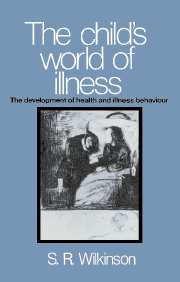Book contents
- Frontmatter
- Contents
- Acknowledgements
- Glossary
- 1 Presenting a problem
- 2 The form of dialogue
- 3 What has gone before: some background information
- 4 The primary structure to the child's world of illness
- 5 Germs and bugs: causal agents
- 6 Dirt and fresh air: the exogenous system
- 7 My castle and the good germs: the endogenous system and its boundary
- 8 ‘Pretend illness’: An analysis of how communication patterns can foster particular forms of complaints
- 9 The consultation: a form of dialogue
- 10 Health education and health promotion
- Appendixes
- References
- Index
8 - ‘Pretend illness’: An analysis of how communication patterns can foster particular forms of complaints
Published online by Cambridge University Press: 23 September 2009
- Frontmatter
- Contents
- Acknowledgements
- Glossary
- 1 Presenting a problem
- 2 The form of dialogue
- 3 What has gone before: some background information
- 4 The primary structure to the child's world of illness
- 5 Germs and bugs: causal agents
- 6 Dirt and fresh air: the exogenous system
- 7 My castle and the good germs: the endogenous system and its boundary
- 8 ‘Pretend illness’: An analysis of how communication patterns can foster particular forms of complaints
- 9 The consultation: a form of dialogue
- 10 Health education and health promotion
- Appendixes
- References
- Index
Summary
‘It is in what people pretend that true morality may be discovered.’
Bishop Butler quoted in Gillon (1985).In order to show how physical complaints are established as part of the child's world of illness I will now proceed to link the observations I made in my study with research carried out into abdominal pain in childhood and somatisation disorder in adults. This will point to ways in which children develop special dialects for complaining, an understanding of which opens up a variety of new treatment approaches.
It has been seen that when children are growing up they have a wide range of views on illness and how it is caused. Their views change over the years in a sequence described as though conforming to the stages outlined by Piaget (Neuhauser et al., 1978; Carandang et al. 1979; Whitt et al., 1979), the stages being the same in hospitalised children (Simeonsson, Buckley & Monson, 1979). Piaget's approach had predominantly been an ego-psychology which did not stress the ecology of the developmental process. As we have seen it has been necessary to place more emphasis on the form of the relationships with the child, how questions are presented to the child (Donaldson, 1978; Samuel & Bryant, 1984) and how the child presents his questions (Tizard & Hughes, 1984). The questions asked must make sense to the child with his experience of the world and especially his relationships (Hobson, 1980, 1982).
- Type
- Chapter
- Information
- The Child's World of IllnessThe Development of Health and Illness Behaviour, pp. 175 - 200Publisher: Cambridge University PressPrint publication year: 1988



